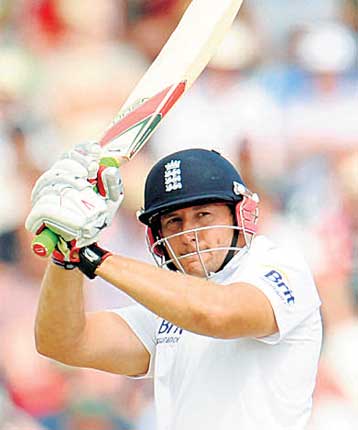England's lower order are already No 1 – at stacking up the runs

Your support helps us to tell the story
From reproductive rights to climate change to Big Tech, The Independent is on the ground when the story is developing. Whether it's investigating the financials of Elon Musk's pro-Trump PAC or producing our latest documentary, 'The A Word', which shines a light on the American women fighting for reproductive rights, we know how important it is to parse out the facts from the messaging.
At such a critical moment in US history, we need reporters on the ground. Your donation allows us to keep sending journalists to speak to both sides of the story.
The Independent is trusted by Americans across the entire political spectrum. And unlike many other quality news outlets, we choose not to lock Americans out of our reporting and analysis with paywalls. We believe quality journalism should be available to everyone, paid for by those who can afford it.
Your support makes all the difference.England have come a long way in the last 12 years – from the world's worst Test team to virtual table-toppers, for a start. And while the reasons behind their climb are many and varied, the run-scoring ability of the lower order is an especially significant factor.
Back in 1999, when Nasser Hussain's side lost to New Zealand at The Oval to hit rock bottom, in statistical terms, their Nos 8 to 11 were Andrew Caddick, Alan Mullally, Phil Tufnell and EdGiddins.
There is no doubt that particular quartet possessed a number of talents. But batsmanship, in either attacking or defensive form, would not be close to the top of anyone's list. Only Caddick (10.37) ended his Test career with a double-figure batting average – the other three were all below six – and none of them managed so much as a half-century.
What a difference a decade makes. Duncan Fletcher, who arrived as coach towards the end of 1999, was adamant that no team of his would take the field with three No 11s. But if there was a wry smile on his face yesterday as he watched from the visitors' balcony while England's bowling batsmen were having huge fun, television cameras failed to detect it.
Andy Flower, a couple of England coaches down the line from Fletcher, must wait a few weeks to find out whether this team is officially No 1 in the world. But his side's lower order is the best – and has been for three years – when it comes to run-scoring. Fact.
Since 2008, England wickets seven to 10 have accumulated more than 5,700 runs at an average of 27.57. And, during that time, there have been 11 century partnerships and 25 of 50 or more. Impressive statistics? Definitely – and unmatched by any other team.
Matt Prior, arguably the best wicketkeeper-batsman in the world right now, has played a significant role in many of the bigger stands. His 73 on Sunday was a typically destructive innings (coming off only 60 balls) but in this Test even he would be happy to bend the knee to Tim Bresnan.
If ever England do decide to bite the bullet and play five front-line bowlers, Bresnan will be one of them, surely. Although going in at No 8 in Nottingham, the Yorkshireman looks a proper batsman who would not be out of place at least one spot up the order.
Bresnan's second-innings 90 lifted his Test average to within tickling distance of 38 after eight appearances. And when India glanced at their opponents here and saw that Stuart Broad (averaging 29 and with a Test century to his credit), Graeme Swann (average 23) and Jimmy Anderson (nearly 12 and with a good enough defence to be the regular nightwatchman) were still to come, it was hardly surprising their shoulders sagged.
It is not just the quantity (or the quality) of runs scored by England's lower order that takes the breath away. Generally speaking, they rack them up at such a rate of knots they give themselves extra time with the ball to put the boot in. The partnership of 119 between Prior and Bresnan was plundered off 120 balls while the Bresnan-Broad alliance was even quicker with 82 runs coming from 79 deliveries.
Bresnan is not yet a fixture in the Test team and only played here because Chris Tremlett succumbed to back and leg injuries. He will be a hard man to drop at Edgbaston next week, though, having followed up his excellent batting with accurate and aggressive bowling to send India reeling yet again.
Stats Magic: The numbers that matter from the fourth day
97 England faced 14 overs in the first hour yesterday and scored 97 runs, with Tim Bresnan and Stuart Broad doing most of the damage. That meant the team had added 284 runs in 49 overs from the moment Ian Bell was reinstated on Sunday.
1 Bangladesh's Javed Omar is the only batsman to have fallen to the first ball of both innings in the same Test (v India, 2007) – but Abhinav Mukund would have joined him in that exclusive "king pair" club had Tim Bresnan clung on to a slips catch yesterday.
654 remains the highest score England have made in the second innings of a Test. They were 654 for 5 at Durban in March 1939, still 42 short of victory, when they had to leave to catch their boat home. Their total of 544 yesterday is England's fifth highest in a second innings.
7 Lancashire swing king Jimmy Anderson has now dismissed Sachin Tendulkar on seven occasions in Test cricket. Only Muttiah Muralitharan (8) can claim more success against the Little Master.
Join our commenting forum
Join thought-provoking conversations, follow other Independent readers and see their replies
Comments